5 Lessons You Can Learn from How Greta Gerwig Wrote and Directed 'Little Women'
Greta Gerwig is a writer and director on fire right now. Learn how she was able to get Little Women made and the lessons she learned writing and directing the feature.

Little Women was a success at the box office and even though it did not win many awards during the season, it had its ardent supporters and cemented Gerwig as a writer/director ready to take on Hollywood.
Behind the Curtain put together an audio and video compilation of several Gerwig interviews in which she talks about her process writing and directing the movie.
Check it out below, then scroll down to read our analysis.
5 Lessons From How Greta Gerwig Wrote and Directed Little Women
Obviously, if you're reading this site, you want to write, direct, produce, or all three. The gems of wisdom we get from Gerwig are all interesting. Let's dive in together.
1. Follow your passion
Greta Gerwig describes her passion for Little Women as almost a lifelong obsession. She read the book constantly as a child but then took a 15-year break, picking it up again in her 30s. What kept her reading it was how contemporary it felt. How much she believed in the story and how the characters affected her.
This passion inspired her to chase the property as an adaptation. And her commitment to the story and fervor behind it landed her the job.
You need to approach your pitches and work with the same passion.
What connects you to the material? What makes you the right person for the job?
2. Hide scenes in plain sight
When Gerwig was preparing to direct Little Women, the studio was constantly worried about the length of the script. So when it came time to cut pages, she did. But she saved them for later. She had a plan. When they got on set, she would block them and hand out the cut pages to her actors.
This allowed her to have the scenes later just in case, and to shoot the movie she felt was complete.
This was really smart. Since the scenes were mostly dialogue, she was able to shoot them efficiently and quickly.
The main lesson here? Don't fight every battle with a studio or financier. Get creative with ways to make them happy and keep the integrity of your work.
3. Find modernity in the story
Little Women is a sprawling book and one that had been adapted fairly traditionally beforehand. So when Greta Gerwig wanted to pitch her version, she needed an angle that made the movie feel necessary for today.
This hook was twofold. She could use flashbacks to tell two concurrent timelines. That way, we were always moving forward in the story. She would juxtapose the magic of girlhood and the reality of adulthood in harmony.
(She made everything on the page easy to read, as well.)
This gave a modern impression of the way girls talk and the way sisters are in real life.
It made the classical more contemporary.
4. Be okay sitting with the problem
Writing is hard. And a lot of times it comes in bursts of pages. That's not a scientific process. It takes inspiration and excitement. So when she was deep in her process, Gerwig was okay taking days to figure things out and just thinking about the problems she was having on the page.
Sure, the book could guide her when needed, but in the adaptation process, she wouldn't count on a steady pace. She would allow her self to write a ton or write nothing, edit, refine, and work forward again.
In your own work, you need to find a balance between rumination and productivity.
But be okay taking your time to find the next few pages. It will pay off.
5. Provide context for the world
We focused on modernity earlier, but you also need to make sure the entire audience understands the world you present to them. In Little Women, the context of the story is incredibly important. It's set a time when women could not vote, own land, or really make money independently.
That meant if you married, it had to be the right person because you were not allowed to divorce, start over, or find anyone else.
The pressure on those decisions greatly informs every character inside Little Women.
And the movie allows us to feel and understand that through excellent worldbuilding.
Think about the context of the world you're writing and directing. Does it come across the page and the screen?
What's next? 5 Lessons from the Safdie Brothers
The Safdie Brothers are two amazing voices unified into one insane vision taking Hollywood by storm. If you're like me, it took approximately 24 hours for your heart to stop beating out of your chest after you saw Uncut Gems. There were times I thought I was in danger of cardiac arrest.
But that's just how the Safdies make movies.















